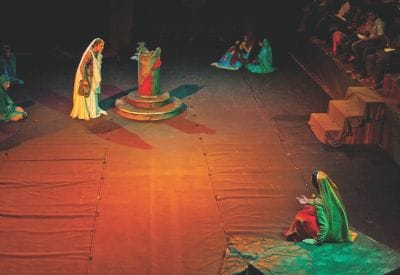The women in Siraj ud-Daulah's life

As an experimental production, the play has its strengths. Photo: Jamil Mahmud
Historically, women have suffered the same fate in every war throughout the ages. Eminent poet and playwright Syed Shamsul Haq's play, “Narigon” (written in 2006), brings to light a dark chapter in the history of Bengal -- the fall of Nawab Siraj ud-Daulah and the fate of the royal women.
Theatre troupe Palakar, which previously produced Haq's “Banglar Maati Banglar Jol”, unveiled the new play for the Dhaka audience. The play premiered at the Experimental Theatre Hall, Bangladesh Shilpakala Academy, on October 1.
The play has been directed by Ataur Rahman. The veteran director is known for effectively translating Haq's writing for the stage. This is the sixth such collaboration between Haq and Rahman.
Haq's pen imagines what could have possibly happened inside the palace, soon after Nawab's fall on July 3, 1757. History does not shed light on what these women went through. So, the dialogues are imaginary.
On the following night of Nawab's fall, Sharifunnesa (wife of Nawab Alivardi Khan, Siraj ud-Daulah's grandfather), Amina Begum (mother of Siraj ud-Daulah) and Lutfunnesa (wife of Siraj ud-Daulah) along with palace maids were imprisoned inside the palace. The psychological trauma that they face; recollections of the roles they played in politics; fond memories -- all create a moving collage.
These imaginary, yet bold, dialogues sound credible thanks to performances by a group of talented actors: Farhana Mithu (as Sharifunnesa), Dipta Rakkhit (Amina Begum) and Tania Hossain (Lutfunnesa).
The royal women consider suicide but cannot as all arms and venomous substances had been confiscated. The noble women are not perfect. They have their prejudices, as demonstrated by their disdain for the royal courtesan (played by Jayita Mahalanbish).
While Sarifunnesa desperately counts on her elder daughter, Ghasheti Begum (Arjumand Ara), the former is left heart-broken. However, Ghaseti's cuffed hands symbolically convey that she is just a pawn -- humanisation of a historically hated character.
Siraj ud-Daulah (Kazi Faisal) appears for a brief moment and does not steal the light from the women who are the protagonists.
As an experimental production, the play has its strengths. Aniket Paul's design sees the performance area as an arena. The designer allocates the corridors [behind the audience] as part of the performance space -- a group of royal guards roam around all the time. Transparent fabric surrounding the arena and the audience from behind create maze-like insides of a palace.
The production is further strengthened by Lucy Tripti's costumes, Ajay Das' music and Thandu Raihan's light.

 For all latest news, follow The Daily Star's Google News channel.
For all latest news, follow The Daily Star's Google News channel. 



Comments